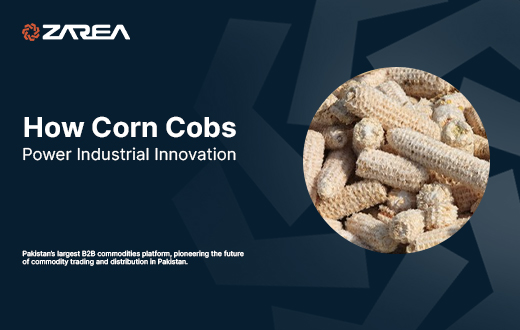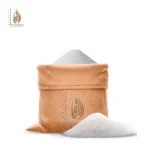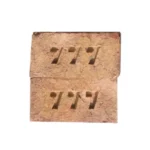Unlocking the Hidden Potential of Corn Cobs – From Kitchen Delights to Sustainable Innovations:
Corn cobs frequently become waste, yet these unassuming leftovers are full of unexplored potential. If you’re aiming to enhance your cooking, engage in sustainable methods, or discover eco-conscious crafts, corn cobs are a flexible resource you may have missed. Here’s a way to transform these frequently thrown-away leftovers into worthwhile resources.
In a world perpetually pursuing sustainable alternatives, the agricultural sector frequently leads the way in innovation. One innovation that is gaining popularity is the use of corn cobs for industrial applications. Zarea.pk, a top supplier of agricultural byproducts, is leading this initiative by providing corn cobs along with other sustainable options such as bagasse, wheat straw, and rice husk.
Corn cobs, often regarded as farming byproducts, are increasingly being utilized across different sectors, shifting from simple leftovers of agriculture to important materials for industrial uses. Let’s explore how this shift takes place and the extraordinary path from farm to factory.
The Beginning – Harvesting Corn:
Everything begins on the farm, where corn is picked for its kernels, leaving the cobs behind. Historically, these cobs were either thrown away or utilized as animal fodder or bedding material. Nonetheless, with technological progress and an increasing focus on sustainability, these simple cobs are now acknowledged for their possibilities beyond agriculture.
Corn Cob Wonders in the Kitchen:
Corn cobs are not merely a holder for those succulent kernels—they’re full of flavour and can elevate your culinary creations. Explore these tasty and inventive ways to use food:
Corn stock
Don’t throw away those cobs! They’re flavor dynamos ideal for creating corn stock, a simple-to-make foundation for soups, stews, and sauces. Cook the cobs gently with your preferred herbs and spices for approximately one hour. The outcome? A luxurious, golden liquid overflowing with the flavor of corn. Employ it to elevate a luscious bisque, improve risotto, or craft the perfect corn chowder.
Corn Cob Jelly
Convert the delicate sweetness of corn cobs into an enjoyable delight with corn cob jelly. This traditional spread complements toast, biscuits, or can even be used as a glaze for roasted meats. By boiling the cobs to draw out their essence, straining the resulting liquid, and incorporating pectin, you can create a sweet, golden jelly that is both distinctive and tasty.
Corn Cob-smoked meats
Attention grilling enthusiasts: corn cobs serve as excellent smoking fuel. Submerge them in water and place them on the coals or in a smoker box to impart a delicate, sweet corn fragrance to meats such as fish, poultry, or sausages. It’s an easy method to enhance your grilling skills with a smoky flair.
Processing – Transforming Waste into Wealth:
After harvesting, the corn cobs go through several processing stages to ready them for industrial applications. This includes washing, drying, and occasionally grinding the cobs into a more convenient form. Zarea.pk utilizes advanced facilities and eco-friendly methods to guarantee that the processing is both effective and kind to the environment.
Major Applications – Powering Industrial Innovation:
Outside the kitchen, corn cobs gleam as a tool for eco-friendly living. Their durable structure and inherent qualities render them ideal for creative, eco-friendly uses.
Corn Cob Biochar
Corn cobs can be converted into biochar, a charcoal-like material that revolutionizes agriculture. Utilized as a soil enhancement, biochar can boost crop production by as much as 95%, enhances soil quality, and aids in carbon sequestration, lowering greenhouse gas emissions. Biochar can be produced using conventional TLUD (Top-Lit Updraft) techniques or advanced equipment for better efficiency.
Biofuel Power
Dehydrated corn cobs serve as a superb renewable energy resource. They can be converted into biofuels such as ethanol, fueling vehicles or acting as a substitute heating option. Utilizing corn cobs as a source of energy helps lower your reliance on fossil fuels and promotes a more sustainable future.
Compost Boost
Include corn cobs in your compost heap to balance carbon-heavy “browns” with nitrogen-heavy “greens.” The cellulose content they possess fosters a perfect setting for microorganisms, accelerating decomposition and enhancing your compost with essential nutrients for your garden.
Natural Scouring Material
Ground corn cobs serve as a natural, biodegradable abrasive ideal for cleaning pots, pans, and outdoor furniture. Bid farewell to aggressive chemical cleaners and welcome an environmentally friendly method to maintain cleanliness.
Animal bedding
Processed corn cobs serve as great bedding for small pets such as hamsters, guinea pigs, or rabbits. Their soft, absorbent qualities aid in soaking up liquids and managing odors while being gentle on delicate paws and respiratory systems.
Sustainable Solutions for a Greener Future:
By utilizing the capabilities of corn cobs and additional agricultural byproducts, Zarea.pk is not only minimizing waste but also aiding in the creation of a more sustainable future. By adopting creative approaches and dedicating themselves to environmental care, they are leading the charge for a more sustainable, resource-efficient economy.
Why Embrace Corn Cob Creativity?
Rethinking our use of corn cobs minimizes waste and creates exciting, sustainable possibilities. Whether preparing a tasty broth, creating a distinctive jelly, or investigating sustainable options like biochar or organic cleaners, corn cobs demonstrate that even basic ingredients can possess remarkable possibilities.
Conclusion:
- The transition from farm to factory illustrates the transformative potential of agricultural byproducts such as corn cobs. What was previously viewed as garbage is now fueling industrial creativity and sustainability.
- As companies such as Zarea.pk take the lead, the opportunities for transforming agricultural waste are limitless.
- As we strive to find answers to ecological issues, let us turn to the land and agriculture for guidance, acknowledging the unutilized possibilities of nature’s wealth.


































